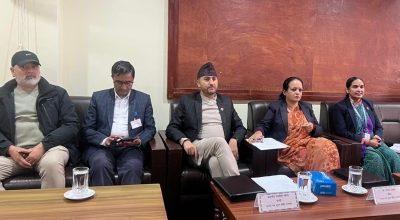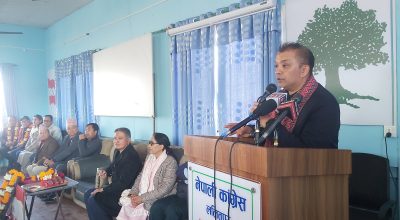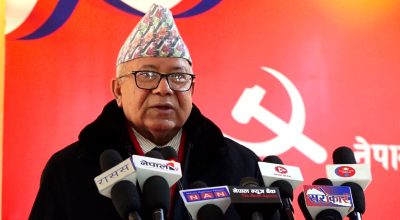
Jamuna Barsha Sharma
Pokhara, Aug 20: It has been a year since a 23-year-old woman of Pokhara Sub Metropolitan City-25 got married. The woman, who is now pursuing her master’s level, is planning her pregnancy only after completing her studies. But she fears that using contraceptives may lead to “infertility”. “I am afraid that sometimes friends would say that using temporary means of family planning before a baby is born will make it difficult to conceive. I heard that contraceptives may lead to infertility,” she said.
However, her spouse is not interested in using contractive himself adding to her problem. “Sometimes the issue has been so intense that I fear of conceiving a baby while having sexual intercourse. I am always afraid that my studies will get affected if I have a baby,” she shared.
A 24-year-old woman, who worked for a private organisation, had to quit her job after she has an unwanted pregnancy. “It has been one and a half years since I was married. Now, I am five months pregnant. We had planned of not having a baby for some years. But I did not use contraceptives as I heard that they may lead to infertility. My spouse did not use them either,” she said. They had thought of resorting to abortion. “But we abandoned the idea after we heard that I may not conceive another baby if I have first abortion. I am now facing many problems since I conceived a baby,” she said.
A Buhari (daughter in-law) group with 70,000 members has been formed. The group members every day openly shared their problems on social media. A group member writes, “My husband does not use contraceptives while having intercourse. We have a three-year-old baby girl. We are not planning to have another child until some years. But I had abortion three times after having unwanted pregnancy. I would gain weight and it will be difficult to conceive a baby if I use temporary means of family planning. I need appropriate suggestion.”
Responding to the post, many members suggested having a three-month contraceptive injection while some others proposed that husbands should use contraceptives.
Many married women have misconceptions about contraceptives thus inviting many problems, said health workers.
However, doctors have ruled out any such misconception that contraceptive devices lead to infertility. Women are forced to have unwanted pregnancy without consulting a doctor, said gynecologist and obstetrician Dr Madan Khadka. “There are misconceptions in the society that using temporary means of family planning before having a first child lead to infertility. This is completely baseless. One should not use contraceptives without doctor’s consultation. All contraceptives are safe. There is no need to fear,” he said. Temporary means of family planning prevents unwanted pregnancy, he said, adding, “One should not follow misconceptions as contraceptives are scientifically tested. Such misconceptions about contraceptives may lead to only mental and physical problems.” He stressed the need for imparting education about reproductive health.
The issue of conceiving a child should take place in mutual understanding between both husband and wife. “But in our society, having a child is related only to a woman. Men should cooperate until their wives are ready mentally and physically to have children. They can use contraceptives,” he said.
Effects of contraceptives remain only until using them. One can conceive a baby some time after discontinuing them, he said. According to him, women of any age group should consult doctors before using contraceptive devices.
Despite the campaign ‘My Body My Rights’ in place, women continue being forced to have unwanted pregnancy, said women rights activist Bina Silwal. “It requires the protection of the right of reproductive health. The mindset of treating women as a machine to give birth should be changed,” she said. Women cannot openly speak about the right of reproductive health under pressure of families, she said. “Women worry about the issue of giving birth after marriage. There is a situation where only women are subject to use contraceptives or face consequences. Only women are in tension when they are infertile. They themselves have to face the consequences of unwanted pregnancy.”
The responsibility of family planning belongs to both women and men. But men seek only sexual pleasure by not using contraceptives while women have to face the risk of the consequences possibly caused by this, she said. For increasing equal participation of both men and women in family planning, there is a need for public education on reproductive health and understanding between the couple, she viewed.
According to Article 38 (2) of the constitution of Nepal, every woman shall have the right to safe motherhood and reproductive health. But this has not been practically implemented, said advocate Bhagawati Pahari. “A monitoring is required to ensure if women’s right to reproductive health is being implemented.”
Women give up their wishes when they put happiness of the family at the centre, and they should become the part of the consequence, she viewed. Data showing only a few men using contraceptives has indicated that women are deprived of enjoying their right to reproductive health, she said.
According to data with the Ministry of Health and Population for the fiscal year, 2021/22, three percent of women underwent sterilisation, and only one percent men. Similarly, 14 percent of women have got birth control implants in place and two percent copper IUD, and 38 percent use Depo Provera and 19 percent pills. But only 23 percent of men use contraceptive devices. RSS
















